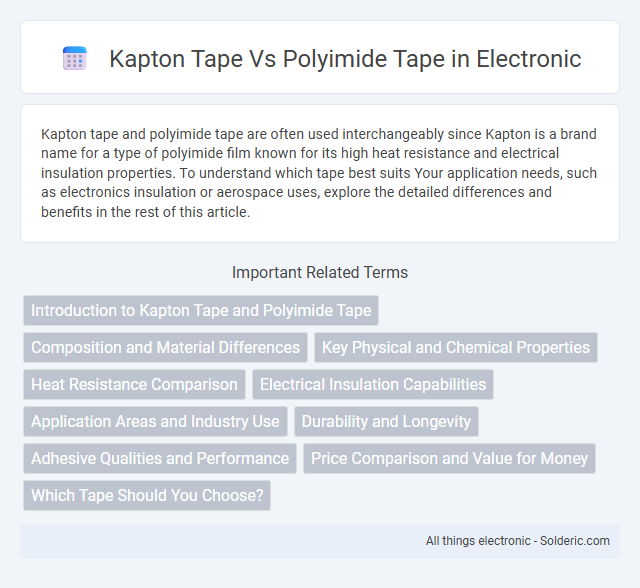Kapton tape and polyimide tape are often used interchangeably since Kapton is a brand name for a type of polyimide film known for its high heat resistance and electrical insulation properties. To understand which tape best suits Your application needs, such as electronics insulation or aerospace uses, explore the detailed differences and benefits in the rest of this article.
Comparison Table
| Feature | Kapton Tape | Polyimide Tape |
|---|---|---|
| Material | Polyimide film with adhesive | Polyimide film with adhesive (same as Kapton) |
| Temperature Resistance | -269degC to 260degC (-452degF to 500degF) | -269degC to 260degC (-452degF to 500degF) |
| Electrical Insulation | Excellent | Excellent |
| Chemical Resistance | High resistance to solvents and chemicals | High resistance to solvents and chemicals |
| Adhesive Type | Varies: silicone or acrylic | Varies: silicone or acrylic |
| Common Uses | Electronics insulation, 3D printing heat bed masking, aerospace applications | Electronics insulation, 3D printing, electrical masking, aerospace |
| Thickness | 25-50 microns typical | 25-50 microns typical |
| Transparency | Amber transparent | Amber transparent |
| Price | Moderate to high | Moderate to high |
Introduction to Kapton Tape and Polyimide Tape
Kapton tape and polyimide tape both refer to high-performance insulating films made from polyimide polymer, known for exceptional thermal stability and chemical resistance. Kapton is a specific brand name for polyimide film produced by DuPont, often used interchangeably with polyimide tape in electronics, aerospace, and electrical insulation applications. Polyimide tapes provide excellent dielectric strength, withstand extreme temperatures from -269degC to +400degC, and are widely used for circuit board insulation, wire harnessing, and 3D printing heatbeds.
Composition and Material Differences
Kapton tape and polyimide tape are often used interchangeably but differ slightly in composition; Kapton tape is a brand-specific type of polyimide film tape known for its high thermal stability and chemical resistance. Polyimide tape encompasses a broader category of tapes made from polyimide polymers, which offer excellent insulation properties and durability under extreme temperatures. Your choice between the two should consider the specific polyimide formulation and adhesive backing suited for your application's thermal and chemical requirements.
Key Physical and Chemical Properties
Kapton tape and polyimide tape are essentially the same, as Kapton is a trademarked version of polyimide film produced by DuPont. Key physical properties include high-temperature resistance up to 400degC, excellent electrical insulation, and flexibility, making both tapes ideal for electronics and aerospace applications. Chemically, polyimide tape exhibits outstanding chemical stability, resistance to solvents, and low outgassing, ensuring durability in harsh environments and demanding industrial processes.
Heat Resistance Comparison
Kapton tape, a type of polyimide tape, exhibits exceptional heat resistance, typically withstanding temperatures up to 400degC (752degF) without degrading. Polyimide tape in general shares this characteristic, making both ideal for applications involving high-temperature environments like electronics manufacturing and insulation. The superior thermal stability of Kapton tape ensures consistent performance where heat resistance is critical.
Electrical Insulation Capabilities
Kapton tape and polyimide tape both provide exceptional electrical insulation capabilities due to their high dielectric strength and thermal resistance. Kapton tape, a type of polyimide tape, offers superior electrical insulation, making it ideal for applications involving high voltages and extreme temperatures. When selecting insulation for your electrical projects, consider that Kapton tape ensures reliable performance in demanding environments where safety and durability are critical.
Application Areas and Industry Use
Kapton tape and polyimide tape are widely used in electronics manufacturing, aerospace, and automotive industries due to their excellent heat resistance and electrical insulation properties. Kapton tape, a type of polyimide tape, is specifically favored for circuit board protection, solder mask applications, and high-temperature masking during powder coating because of its superior dielectric strength. Your choice between Kapton and generic polyimide tapes depends on specific temperature ranges and chemical resistance required for semiconductor fabrication, 3D printing, and electrical insulation tasks.
Durability and Longevity
Kapton tape and polyimide tape are often considered the same, as Kapton is a brand of polyimide tape known for exceptional durability and thermal resistance. Polyimide tape offers high longevity by maintaining structural integrity under extreme temperatures and chemical exposure, making it ideal for electronics and aerospace applications. Your choice should focus on specific brand quality and thickness to ensure maximum performance and lifespan in demanding environments.
Adhesive Qualities and Performance
Kapton tape and polyimide tape are essentially the same products, as Kapton is a brand name for polyimide film tapes. Both tapes exhibit exceptional adhesive qualities, featuring high-temperature resistance up to 260degC, which ensures strong adhesion without residue on delicate surfaces such as circuit boards during soldering processes. Their chemical resistance and excellent dielectric properties make them ideal for electrical insulation and masking applications in electronics manufacturing.
Price Comparison and Value for Money
Kapton tape and polyimide tape are often compared because Kapton tape is a specific type of polyimide tape known for exceptional heat resistance and electrical insulation properties. Kapton tape tends to be more expensive due to its high-performance specifications, but it offers superior durability and reliability, making it a better value for critical applications. Your choice should consider the balance between initial cost and long-term performance, ensuring that investment in Kapton tape delivers cost-effectiveness through enhanced longevity and reduced replacement frequency.
Which Tape Should You Choose?
Kapton tape and polyimide tape are essentially the same product, both made from polyimide film known for high heat resistance and electrical insulation properties. Choose Kapton tape for applications requiring excellent thermal stability up to 260degC, such as electronics manufacturing, 3D printing, or soldering processes. Polyimide tape offers superior chemical resistance and mechanical strength, making it ideal for aerospace, automotive, and industrial usage where durability under harsh conditions is critical.
Kapton tape vs polyimide tape Infographic

 solderic.com
solderic.com